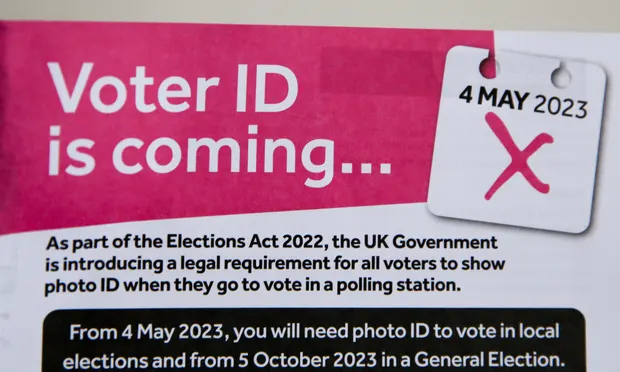Polling stations in England will have extra staff to help voters on 4 May as the government introduces its new rules on photographic ID, the Electoral Commission has said.
Craig Westwood, the director of communications at the commission, told BBC Radio 4’s Today programme that workers had been preparing for months to put plans in place.
The change in voting rules will mean people turning up at polling stations are required to show photographic identification for the first time.
Westwood said: “There will be more staff. Some polling stations, particularly larger ones where there are more people who will be registered in that area, will have greeters, people who are outside the polling station that can just make sure that people are definitely aware of the ID requirement.
He said the polling staff’s detailed training had helped prepare them for some individual circumstances they may experience. “So somebody from the trans/non-binary community who is concerned about having their ID seen in public, somebody who’s wearing a religious headdressing that they need to take off in private to be able to prove who they are. So all of those preparations have been put in place.”
The introduction of mandatory photo ID at the polling booths has been severely criticised by MPs and campaigners.
Ministers recently faced renewed accusations that the plan is a waste of time and resources after statistics showed there was not a single proven case of in-person voter impersonation last year.
The statistics highlighted a point made repeatedly by opponents of voter ID, that it tackles a problem that is almost unknown in Britain, while creating a barrier to voting for the estimated 2 million adults who lack the necessary documentation.
Meanwhile, other official data showed minimal take-up of free official voter documents before local elections in England on 4 May.
Those without ID can apply for a free voter authority certificate, issued by their council but available via a central government portal.
A running tally for central applications, which close on 25 April, shows that as of 2 April, exactly 37,000 people had applied, fewer than 2% of the possible number of voters lacking ID.
Older and younger voters are even less likely to have applied for the document, despite both groups being seen as vulnerable to being put off from voting by the new laws. As of 2 April, just 1,361 people aged 75 or older had applied, 3.6% of the total. Just 6% of applications, 2,247 in all, had been from under-25s.


